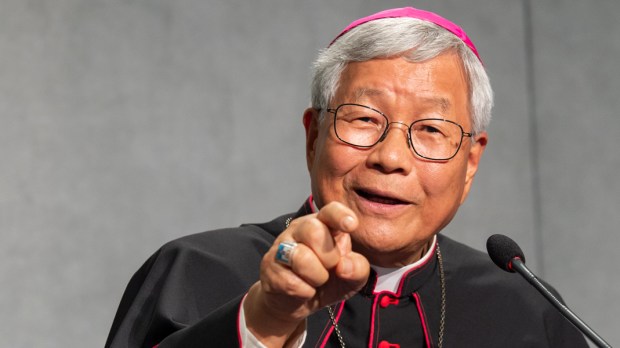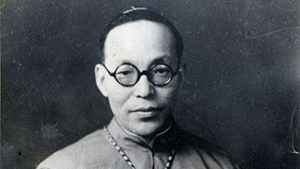Lenten Campaign 2025
This content is free of charge, as are all our articles.
Support us with a donation that is tax-deductible and enable us to continue to reach millions of readers.
On March 1, 2023, Cardinal Lazarus You Heung-sik, current Prefect of the Dicastery for the Clergy, published “As the lightning comes from the East,” a short book-interview on his life as a layman, priest and bishop in South Korea. The book is only available in Italian for now and includes a preface written by Pope Francis. The 71-year-old Cardinal emphasizes the richness of Asian Catholicism from which the West could draw new strength.
You’s conversion to Catholicism during his teenage years
In August 2022, when Pope Francis presented him with the Cardinal’s hat, Lazarus You declared: “I am ready to give my life for you and for the Church.” In wearing the red robes, the color of the blood of martyrdom, the Korean prelate returned to the origins of his own faith, but also that of Korean Catholics.
You comes from a Korean region where Catholicism appeared spontaneously: some laymen started reading the works of the missionary Matteo Ricci and subsequently converted. In fact, many were later martyred.
The future cardinal came from a very poor and non-believing family. However, fascinated since his childhood by these ‘pioneers’ of Korean Catholicism, in particular by St. Andrew Kim, he decided to convert at the age of 16, before in turn converting his family and friends. “When others see our joy as Christians, they are contaminated,” says the Cardinal, whose smile has been noticed even among the Curia.
He explains that conversions like his have been numerous in South Korea. Catholicism is seen as a credible alternative to a culture where Confucianism has been replaced by a very strong materialism and individualism. You notes that, contrary to the image of Christians in the West, Korean Christians are recognized in their country for having “contributed a lot to the growth of the ideas of parity and dignity of all people.”
For a seminary more open to the world
At the age of 18, You decided to become a priest, encouraged by nuns. In his current function in the Roman Curia he is responsible for seminaries around the world and in the book he recalls his own formation experience. The Cardinal says he went through a “crisis” when he realized that the seminary did not correspond to the ideal he had envisioned.
He resolved this tension outside of the seminary by attending a meeting in Frascati, Italy, of the Focolari Movement, which he then joined. You said that the seminary should be thought of as a place “like any other” and not a “little world” closed in on itself. “Seminaries should not be factories of ready-made priests,” he insists.
You, who later directed the Daejeon seminary from 1998 to 2003, advocates a return to the “centrality of the Word” in a formation which he wants to be freer and less “authoritarian.” He also asked that women and lay people intervene regularly in the seminaries, and that the human maturity and affectivity of the seminarians be taken into account during their formation.
Clericalism and priesthood
Ordained in 1979, You affirmed that he lived this sacrament as a “death,” in order to give himself fully to his mission of serving God and others. He considers that a priest should not have an “idealized vision” of the priesthood, but rather, with “patience,” should adapt it to the social and cultural context in which he finds himself.
Cardinal You warns against “the nostalgia of traditionalism” behind which hides the “desire to return to a society in which the priest was ‘someone.'” He invited priests to “have the courage” to be “against the current” and not support a vision in which their “authority is always accompanied by visible signs of power and wealth.”
You also insists that priests must be careful of not exhausting themselves and should not try to control everything in their parishes. To do this, they must learn to live “in a network” and not “at the center” of their community.
A committed bishop who never knew his father
In 2003, Pope John Paul II named Father You coadjutor bishop of Daejeon, and he became its archbishop in 2005. In his episcopal ministry, he says he worked especially hard to be close to his priests in order to “really share the life of the diocese.”
As a bishop, You has been strongly committed to the dialogue between the two Koreas and has crossed the border several times with Korean Caritas delegations. Some circles in South Korea thus consider him as a “red bishop.” He is also a strong supporter of a papal trip to North Korea.
In the book, the Cardinal talks about his father, whom he never met because he disappeared a few days after his birth in 1951, in the middle of the Korean War. You explains that although his father was presumed dead in battle, he may in fact have joined North Korea, shedding new light on the Cardinal’s involvement in this political issue.
An Asian cardinal at the bedside of Western Catholicism
In 2021, Pope Francis called You to Rome to head the Dicastery for the Clergy. He says he was struck during his first meetings with European bishops by their concern and suffering in the face of the de-Christianization that their countries are experiencing. He contrasts this with Asian Christianity in which he believes the Church manages to bring together “faith and culture.”
“We are called to rediscover the vigor and enthusiasm of a new proclamation of the Gospel,” he told the Western bishops, acknowledging that there are no “easy recipes” for this. He laments that Christianity is often too focused on “external and organizational aspects,” which makes it lose “its flavor.”
Cardinal You therefore invites Christians to do “a little self-criticism” and to listen to the times in order to find new ways to evangelize. “In the West, Catholicism may need new readings of reality and of people’s lives, in order to reformulate the demand for God in a new way,” he said.
Finally, the Prefect warned against sterile disputes. For example, he affirmed that the question of divorced-married couples must be considered “according to the only absolute value that is love.”
“In the Church, we must remember this: it is better to be imperfect in communion than to be perfect in disunity,” he insists, giving as a model the first Christian communities that appeared after Jesus’ death.
A Cardinal endorsed by Pope Francis
In Pope Francis’ preface he invites us to follow the path traced by the book to “decentralizing ourselves, by making a journey to the East.” He praises in particular the “new style of spiritual and ecclesial life” that the man he made a Cardinal in August 2022 proposes, considering that he “can reinvigorate our faith.”
Visibly fascinated by a Korean Church that is “young and enterprising, born of the laity, and an instrument of hope and compassion,” the Pope sees it as an inspiration for the universal Church. “We all need this light that comes from the East,” he said in a very prophetic style. He thanked Cardinal You for giving this “joyful testimony of a living Church.”
Pope Francis met Cardinal You during his 2014 trip to South Korea. The then archbishop of Daejeon (2005-2021) was coordinating the Asian World Youth Day. In 2021, the Pontiff appointed him to head the Dicastery for the Clergy.
Like Filipino Cardinal Luis Antonio Tagle, the current Pro-Prefect of the Dicastery for Evangelization and often cited as a ‘papabile,’ Cardinal You has become one of the most important representatives of the Asian Church in Rome: A status which, in view of the high esteem in which Pope Francis holds him, now gives him an important place in the College of Cardinals


